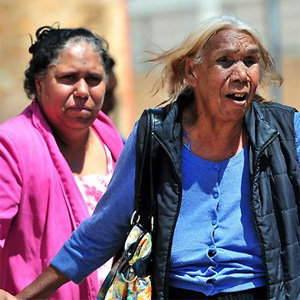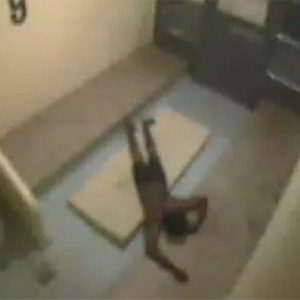Coroner slams NT police over Kwementyaye Briscoe's death
Xavier La Canna (AAP) Sydney Morning Herald 17 September 2012
Northern Territory Coroner Greg Cavanagh has slammed the actions of police who dealt with an Aboriginal man who died in custody in Alice Springs.
In his 79-page findings, Mr Cavanagh said some police who dealt with the man known since his death as Kwementyaye Briscoe were immature and utterly derelict in their duties.
"I find that the care, supervision and treatment of the deceased while being held in custody by the Northern Territory police was completely inadequate and unsatisfactory, and not sufficient to meet his medical needs," Mr Cavanagh said on Monday.
He said the death was preventable and should not have occurred.
Despite having committed no crime, Mr Briscoe was taken into protective custody on January 4 because he was extremely drunk, and he was found dead in his cell five hours later.
Soon after he was arrested and placed in the back of a police van he drank most of a 700ml bottle of rum carried by another prisoner who had not been properly searched, and the coroner said this might have contributed to his death.
At the watch-house one officer, Constable Gareth Evans, was recorded on CCTV dragging Mr Briscoe along the ground.
Const Evans later used "undue vigour" to sling Mr Briscoe towards a counter, but probably did not commit any offence, Mr Cavanagh said.
Two probationary constables on duty at the time when Mr Briscoe was in custody, David O'Keefe and Janice Kershaw, came in for special criticism.
Mr Cavanagh said they failed to keep Mr Briscoe under close observation as directed and were "utterly derelict".
"They were distracted apparently by various things including an iPhone, iPod and the internet," he said.
Aboriginal leader Barbara Shaw from Alice Springs called for Const Evans to be sacked over his handling of Mr Briscoe.
If an Aboriginal police officer had been caught being rough to a non-Aboriginal person charges would have been laid, Ms Shaw said.
The coroner said the probable cause of Mr Briscoe's death was a combination of being very drunk, positional asphyxia and aspiration, which obstructed his airways.
He said up to 10 police officers had been formally disciplined over errors and failures in relation to Mr Briscoe on the night he died.
NT Police Commissioner John McRoberts confirmed no officer had been sacked over Mr Briscoe's treatment and no criminal charges had been laid, but said lessons had been learnt.
"The changes that have been made to NT police policy and procedures since then will go as far as we possibly can to prevent a repeat," Mr McRoberts said.
Professor Hal Wootten, a royal commissioner during an investigation into Aboriginal deaths in custody that released its findings in 1991, said young police were not aware enough of the issue.
"It is very disappointing that the police force is not making them aware of these issues, which are perennial issues," Prof Wootten told AAP.
A friend of Mr Briscoe's family, Hilary Tyler, said the coronial inquest had been hard on the relatives.
"The emotional intensity and the sadness and despair and frustration that people have been feeling has been so hard," Dr Tyler said.
Among his recommendations, Mr Cavanagh said police should be instructed not to drag prisoners around and to consider obtaining a wheelchair, stretcher or something else to transport those unable to move themselves.
To the NT government, Mr Cavanagh recommended urgent attention be given to providing nurses on a daily basis to watch-houses in Darwin, Alice Springs, Katherine and Tennant Creek.
"I acknowledge the significant efforts taken by the Northern Territory government to address problem drinking, but something more must be done," he said.
NT Chief Minister Terry Mills committed his government to implementing the coroner's recommendations.
"In addition ... I want to ensure there is a genuine change of culture within the police force," Mr Mills said in a statement.
Cops got away with murder, say family of Kwementyaye Briscoe
Rebecca Puddy The Australian 18 September 2012
The family of an Aboriginal man who died in police custody in Alice Springs have accused officers of "getting away with murder" after a recommendation by the Northern Territory Coroner that no charges be laid.
This is despite Coroner Greg Cavanagh yesterday finding a lack of care and multiple failings by police were the cause of the man's death on January 5.
The 27-year-old man, known since his death as Kwementyaye Briscoe, had committed no crime but was taken by patrol officers to the Alice Springs watch house for being drunk. He was to be kept overnight in protective custody.
Grief-stricken family members yesterday screamed at senior police officers, including Assistant Commissioner Mark Payne, as they left court in Alice Springs following the coroner's findings from an inquest held in June.
Briscoe's aunt, Patricia Morton-Thomas, said the family felt police had escaped any serious punishment. "It just seems to our family that once again police have gotten a little slap on the wrist," Ms Morton-Thomas said.
"It's really hard to have any kind of faith in the judicial system when nothing has happened. A person has died in their care and nothing has come of it."
Mr Cavanagh said there were "multiple failings" by individual police and senior management that resulted in Briscoe's death.
"I find that the care, supervision and treatment of the deceased while being held in custody by the NT police was completely inadequate and unsatisfactory and not sufficient to meet his medical needs," Mr Cavanagh said.
"This lack of care resulted in his death, that is to say, this death was preventable and it should not have occurred. The catalogue of errors is so extensive and involves so many police officers of various rank as to suggest mismanagement for a period of time by police command at a level higher than just 'local'."
Despite these failings, the coroner did not recommend criminal charges be laid against individual police officers, noting that even the family's lawyer had not asked him to refer his findings to the Director of Public Prosecutions.
Ms Morton-Thomas said the family had asked their legal aid lawyers about criminal charges, but were not told it was an option.
She said the family was seeking expert legal advice about whether to seek compensation in a civil claim.
Police Commissioner John McRoberts said several officers had been disciplined and widespread reform had occurred in watch houses across the Territory to prevent another death.
"I don't know that Mr Briscoe's family will ever get justice," Mr McRoberts said.
"I am very confident that the lessons that have been learned from his death and the changes that have been made to Northern Territory police policy and procedures since then will go as far as we possibly can."
He described the Alice Springs watch house as a "stressful, dynamic and complex place to be".
An estimated 235,000 people had been taken into protective custody by police in the Territory during the past five years, he said.
"That is more than the Northern Territory population," he said.
The coroner made five recommendations, including the cessation of the practice of dragging prisoners on the ground of the watch house and the provision of nurses to monitor welfare.
Mr Cavanagh also recommended the government meet urgently with all major stakeholders in Alice Springs to address binge drinking and availability of an "excessive" amount of alcohol.
"The fact that so many detainees suffer from a combination of alcohol toxicity and chronic ill health means that police must care for large numbers of very drunk, very sick people in watch houses that are not designed for sick people."
Chief Minister Terry Mills committed his government to implementing the coroner's recommendations.
Call for independent inquiry into NT Police
Kristy O'Brien ABC News 18 September 2012
The Australian Council for Civil Liberties says there should be an independent inquiry into senior Northern Territory police, after another damning Aboriginal death in custody report.
An inquest into the death of 27-year-old Kwementyaye Briscoe in the Alice Springs watch house earlier this year has found the death was preventable.
Mr Briscoe had been taken into protective custody because he was drunk.
Post mortem results showed he had a potentially lethal blood alcohol level of 0.350 per cent.
Coroner Greg Cavanagh found he died from the combined effects of acute alcohol intoxication and the obstruction of his airways due to the position he was lying in.
The coroner said the care provided by police was completely inadequate to meet his medical needs and the lack of care resulted in his death.
The council's Terry O'Gorman says Mr Briscoe died because police did not reform their procedures after the last Alice Springs death in custody three years ago.
"It's caused someone's death for them to fix up problems that they promised to fix up after the last death in custody," he said.
"Questions need to be asked.
"Why has senior management of the Northern Territory Police so fundamentally failed that it has resulted in another death in custody and why are they not being made accountable?"
Mr O'Gorman says there would be widespread sackings in any other Australian jurisdiction if senior police failed to implement recommendations after an Aboriginal death in custody.
"Any other organisation where there was such deep-rooted, high-level ineptitude, heads would roll.
"What degree of accountability is the senior executive service to be subject to in view of the damming, almost unprecedented, language by the coroner in his criticism of the failure by the senior management to follow up on their own promises after the last death in custody that things would be fixed up."
Chief Minister Terry Mills says the police force has exhibited "cultural stubbornness" to change and it must implement the coroner's recommendations.
Mr Mills says he is confident he can work with the Police Commissioner John McRoberts to make significant changes to the system.
"And it appears to be a culture that is resistant to sustained change and so that therefore is the requirement of leadership, of management at a the senior level, to drive these changes through, not just for the short term," Mr Mills said.




